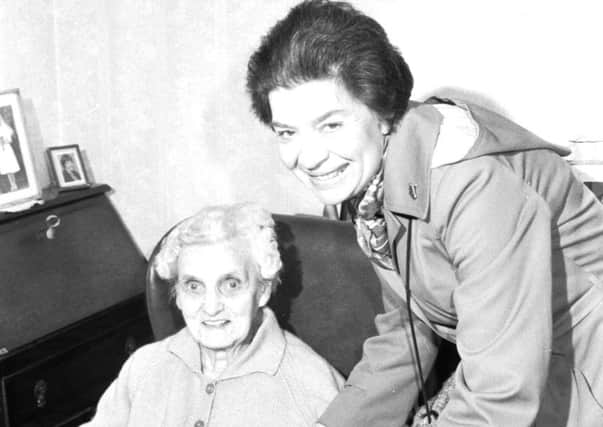Lesley Riddoch: Democracy means keeping it local


It seems nothing will persuade the SNP or any political rival (bar the Scottish Greens) that the woeful state of local democracy in Scotland is worth tackling.
Even though turnout in the last Scottish local elections was a paltry 38 per cent; the average “local” council here serves a population ten times the European average; the physical size is almost 100 times larger than the average German council and Cosla wants the numbers of councils trebled – still politicians think tackling our shaky system of local democracy will disturb too many vested interests and reap too little by way of electoral reward.
Advertisement
Hide AdAdvertisement
Hide AdPerhaps an incentive is required – and perhaps it might be the prospect of improving Scotland’s “spending black hole” by transforming the way councils deliver major items of expenditure.
It’s five years since the publication of the Christie Commission report, which called for prevention, early intervention and collaboration with the community to transform services.
So far relatively little has been done apart from the creation of 31 new organisations to deliver merged health and social care services. Instead most councils have opted to keep cutting 4 per cent from core services rather than contemplate the wholesale change envisaged by the late Campbell Christie.
The Audit Commission’s 2016 Overview of Local Government observes: “The majority of our recent Best Value audits have highlighted a dependency on incremental changes to services, increasing charges and reducing employee numbers in order to make savings. But these are neither sufficient nor sustainable solutions set against the scale of the challenge. Cuts can only be part of the solution.”
The report says councils should examine “opportunities to work with and empower communities to deliver services.”
The problem is that these dry words don’t create a vivid picture of the demographic challenge ahead as pensioner numbers rise – nor of the way lives (and budgets) can be transformed by community instead of council-led solutions.
Take the vexed issue of delivering food and real personalised care to lone, elderly people. Meals on wheels was the service of choice for many years – it began in 1943 to help families bombed during the Blitz and grew from there. In the early days volunteers took extra meals cooked in school kitchens to anyone judged to be in danger of malnutrition. They used old prams to transport the meals and straw bales to keep them warm in transit. It worked because it was truly local. But over the years, councils opted for a less personalised, more “professional” service. Now old folk get a batch of frozen meals to microwave, delivered by an anonymous carrier, not a weel kent local volunteer. That might look cheaper but it creates a slew of bigger long-term problems – there’s been a rise in the number of older folk admitted to hospital with urinary tract infections for example, brought on by the dehydration that accompanies a poor diet – and it gives rise to absurd situations.
Paid carers often request food that takes no longer than six minutes to prepare and microwave – their visit can last no longer and some elderly people have had up to 50 different carers in a year. This is not to criticise professional carers but to observe the serious limitations of the “professional model”.
Advertisement
Hide AdAdvertisement
Hide AdAs Martin Sime of SCVO puts it: “At the moment, money and attention are focused on the 15 minute visit of professionals – not the wider community in which their patients live. Is it the best use of cash?”
That’s where the award-winning Food Train comes in. Set up in 1995 in Dumfries after a survey found old people struggling with weekly shopping, the Food Train now works across seven council areas organising 900 volunteers to help 2,500 elderly folk at an annual cost of £1.25 million – funding 35 mostly part-time staff and the fleet of delivery vans. It delivers a heck of a return on investment.
Mealmaker volunteers sign up to cook a bit more of whatever they’re cooking for themselves and take it round to an older person identified as being in danger of malnutrition by doctors, dentists, home helps, neighbours and occasionally the old folk themselves. But beyond the food, there’s the invaluable human connection provided by the Food Train volunteers – the “social” in social care. Mealmakers (and Food Access volunteers who deliver shopping) help the same elderly person year after year getting to know them well enough to report changes in health. They also return library books, take down curtains, change lightbulbs and help with handyman tasks. It’s invaluable and where the Food Train operates, demand for the council’s “frozen food” falls.
So what are councils going to do – plough on regardless? Change eligibility rules yet again as a desperate way to manage demand? Or will some pioneering councils embrace community-based services as the only viable way to meet the real level of need in Scotland without breaking the bank?
Of course there are objections about un-skilled volunteers replacing skilled paid council staff.
But do all caring jobs demand a high level of taught skills? As one volunteer put it: “What skills do you really need to go shopping?”
Scottish councils can’t keep shaving another 3 or 4 per cent from service budgets in the hope we will all muddle through. For far too long, distant, commercial arrangements made in the name of professional provision have obscured the potential for empowered local communities to care for one another.
If local democracy doesn’t excite MSPs, maybe sustainable community-led service provision might – especially in the fraught area of nursery care. And where one is finally allowed to thrive, the other will surely follow.